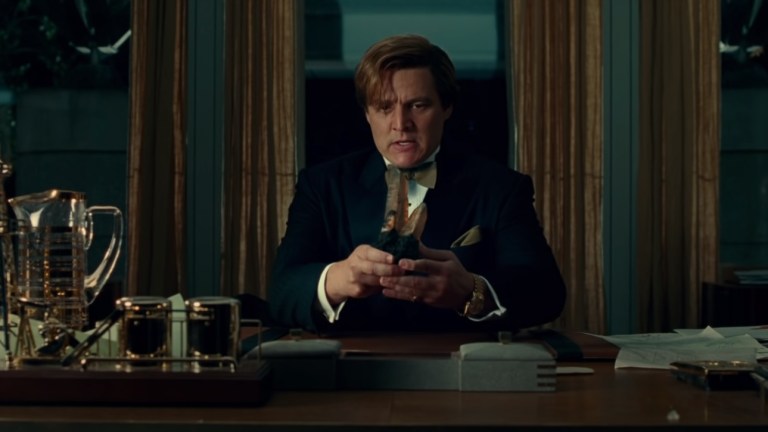Wonder Woman 1984: How Does the Dreamstone Work?
The Dreamstone in Wonder Woman 1984 may feel like a "Monkey's Paw," but it's much more complicated than that.

This article contains Wonder Woman 1984 spoilers. Our spoiler-free review can be found here.
In Wonder Woman 1984 an ancient artifact forged by a god wreaks havoc in the consumerist 1980s by granting those who touch it one wish. Magical wishing objects are rife in storytelling, so much so that kids in playgrounds across the world already know what the correct answer is when you are given just one wish. And no, it’s not $1 million or world peace. It’s an infinite number of wishes.
While that is presumably against “dreamstone” rules in the world of Wonder Woman 1984 (and it usually is or the stories don’t work), sleazy would-be oil baron Max Lord (Pedro Pascal), not content with just the one wish, tries to find a loophole and wishes to be one with the stone itself. That way, he can control who gets a wish and take something in return.
So what are the rules and limitations of this artifact, how does it relate to the story of The Monkey’s Paw and does it manage to adhere to its own internal logic?
History of the Dreamstone
The artifact dubbed the Dreamstone is a citrine imbued with magical powers by the god of lies, also known as the Duke of Deception in the film. It has apparently been around for centuries and often popped up in civilizations that have collapsed. That alone should probably have set off a few alarm bells.
Before Max Lord wishes to become one with the stone Diana Prince and Barbara Minerva both inadvertently wish upon it – Diana wishes to be reunited with Steve Trevor (Chris Pine), while Barbara wishes to be strong, sexy, cool, and special. These wishes are granted but, we learn, they come at a cost. Diana begins to lose her powers while Barbara loses some of her humanity.
The Monkey’s Paw
“It’s a ‘Monkey’s Paw!’” exclaims Trevor, referring to the famous story by W. W. Jacobs first published in 1902. In the story a couple is given an artifact (a monkey’s paw, of course) which will grant them three wishes but each will come with terrible consequences. The man first wishes for £200 (roughly $1 million in old money) only to be told the next day that his son has been killed in a horrific accident at the factory where he works – the factory offers a £200 settlement.
Wracked with grief, his wife wishes their son back to life. The story ends with a hideous knocking at the door, the realization that what’s making the sounds is not the same son that they knew, and the man making his third wish – when his wife opens the door there is no one there.
It’s a brilliant story that has been adapted, mirrored, and parodied throughout literature and media, so it’s a well known reference point, however, the Dreamstone actually isn’t quite a “monkey’s paw” at all. Or rather it’s an unrefined paw with no grasp of irony.
A true “monkey’s paw” for example, would have brought Steve Trevor back to life but hideously maimed, traumatized, or blown to bits. Or it would have turned Barbara into this iPhone 4 case featuring a picture of a donkey (the first first hit on Google when we typed in “strong sexy cool and special”). A true “monkey’s paw” would be yawning at the obviousness of how to fulfill Max Lord’s wish to become one with the stone – not leaving him as a man walking around with the stone’s magical powers, but becoming a stone with a man trapped inside. Dreamstone, yer basic.
But on the other hand, teaching individuals a lesson for messing with fate doesn’t seem to be the Dreamstone’s primary objective, this citrine wants to see the fall of society.
The rules of the Dreamstone’s mischief aren’t quite so clear, then. In the cases of the three who wish on it when it’s just a stone, the wisher gets their wish exactly as they intended it, but grows weaker in other ways – Diana in terms of powers, Barbara in terms of heart, and Max in terms of health – he appears to be growing sicker the more powerful he becomes.
Once Max and the stone are one, however, the rules change.
Rules of the Dreamstone/Max hybrid
Once Max becomes one with the stone the rules seem to shift. Now Max himself appears to be able to take something from the wisher of his own selection. Early on we see him take the security team of the oil baron, in exchange for his wish to have historical lands returned (which for once actually IS a Monkey’s Paw moment since the reality of this wish is a wall erecting itself causing massive unrest). Later, for disposing of a televangelists’ sex tape Lord takes his entire congregation. It is clearly not a negotiation that has been agreed in advance so the moral gets a bit muddied.
As Lord becomes more powerful the rules seem to shift again. People don’t even really actually have to wish anything at all – after a point, Lord can’t just say “don’t you wish there was no traffic” (for example) and it’s enough for his driver just to say “yes’ for it to be granted. What will Lord take from this man? What will the stone take? We’d hope not a great deal.
Each wisher is granted just one wish, we are told, and this plays out in the film when Lord tries to get one of his staff members to wish something for him but finds it doesn’t work since the man had already wished for a Porsche. Later however, Barbara is granted a second wish. It’s not clear how this is possible. Though Lord tells her he is feeling generous, it can’t just come down to Lord’s desire or he would have introduced this clause earlier. Whatever the logic, this allows Barbara to wish to become an apex predator – Cheetah.
Max’s “sermon”
Lord finds a way to broadcast to every screen in the world via “particles” which means that he’s essentially “touching” every citizen and they are all able to make wishes at once. Lord has become so power crazed by this point that all he is seeking is more, more, more, and though the world is falling into disarray he’s indifferent to watching it burn.
It is Diana’s speech, which is also broadcast internationally, which convinces the citizens of the world to take back their wishes. Diana has already done so, meaning Steve Trevor is dead again and she shows faith in humanity, including Lord himself, to do the right thing.
Does EVERYONE take back their wish?
Actually probably not… Diana believes in the goodness of people but she’s not foolish enough to think there are no douchebags out there who care only about themselves. The possibility that not everyone rescinded is important to the ambiguous ending of the movie.
We see Barb, no longer in Cheetah form, cowering in the darkness. Has she taken her wishes back? Has she taken just the Apex Predator wish back (if that’s possible)? Or has she lost her humanity so much in the transformation that she can’t bear to give back her powers? In the fight with Diana earlier, Barbara refused to renounce her powers despite Diana’s pleas so it’s certainly possible she hasn’t changed her mind.
Does taking back a wish work retroactively?
If a wish is taken back does that mean it never happened and therefore are all the consequences of that wish are immediately erased? The answer to this is “no” (because if it was yes then it would only require Lord to take back his wish, to erase every other one since he merged with the stone, including Barbara’s second wish). So Steve Trevor did come back to life for a bit, there was a very real threat of full on nuclear war for a bit, there was a weird wall that came out of nowhere in Cairo and later vanished and a lot of people had Porsches.
It means these events are presumably now canon in the DCEU and any further DCEU movies exist in a world when there was this guy back in 1984 who briefly for a time granted everyone’s wishes and there was nearly an apocalypse, that was a bit weird, remember that?
